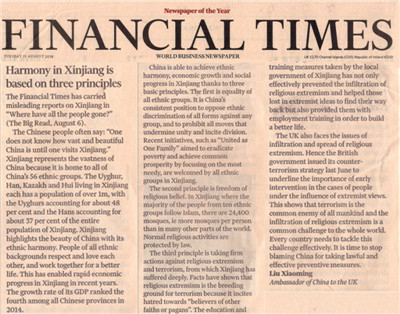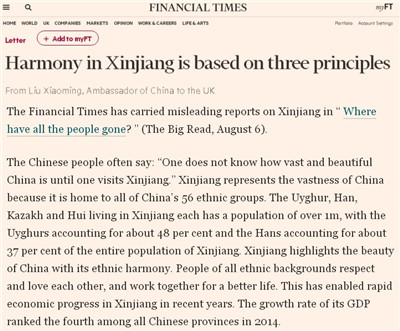|

H.E. Mr. Liu Xiaoming, Ambassador of China to the UK, recently wrote an article to the Financial Times about the latter's misleading reports on Xinjiang. The Financial Times published the article on 21 August 2018 entitled Harmony in Xinjiang is based on three principles. The full text is as follows:
Recently, the Financial Times and some other British media have carried misleading reports on Xinjiang.
The Chinese people often say: "One does not know how vast and beautiful China is until one visits Xinjiang." Xinjiang represents the vastness of China because it is home to all of China's 56 ethnic groups. The Uyghur, Han, Kazakh and Hui living in Xinjiang each has a population of over 1m, with the Uyghurs accounting for about 48 per cent and the Hans accounting for about 37 per cent of the entire population of Xinjiang. Xinjiang highlights the beauty of China with its ethnic harmony. People of all ethnic backgrounds respect and love each other, and work together for a better life. This has enabled rapid economic progress in Xinjiang in recent years. The growth rate of its GDP ranked the fourth among all Chinese provinces in 2014.
China is able to achieve ethnic harmony, economic growth and social progress in Xinjiang thanks to three basic principles. The first is equality of all ethnic groups. It is China's consistent position to oppose ethnic discrimination of all forms against any group, and to prohibit all moves that undermine unity and incite division. Recent initiatives, such as "United as One Family" aimed to eradicate poverty and achieve common prosperity by focusing on the most needy, are welcomed by all ethnic groups in Xinjiang.
The second principle is freedom of religious belief. In Xinjiang where the majority of the people from ten ethnic groups follow Islam, there are 24,400 mosques, ie more mosques per person than in many other parts of the world. Normal religious activities are protected by law.
The third principle is taking firm actions against religious extremism and terrorism, from which Xinjiang has suffered deeply. Facts have shown that religious extremism is the breeding ground for terrorism because it incites hatred towards "believers of other faiths or pagans". The education and training measures taken by the local government of Xinjiang has not only effectively prevented the infiltration of religious extremism and helped those lost in extremist ideas to find their way back but also provided them with employment training in order to build a better life.
The UK also faces the issues of infiltration and spread of religious extremism. Hence the British government issued its counter-terrorism strategy last June to underline the importance of early intervention in the cases of people under the influence of extremist views. This shows that terrorism is the common enemy of all mankind and the infiltration of religious extremism is a common challenge to the whole world. Every country needs to tackle this challenge effectively. It is time to stop blaming China for taking lawful and effective preventive measures.

|

